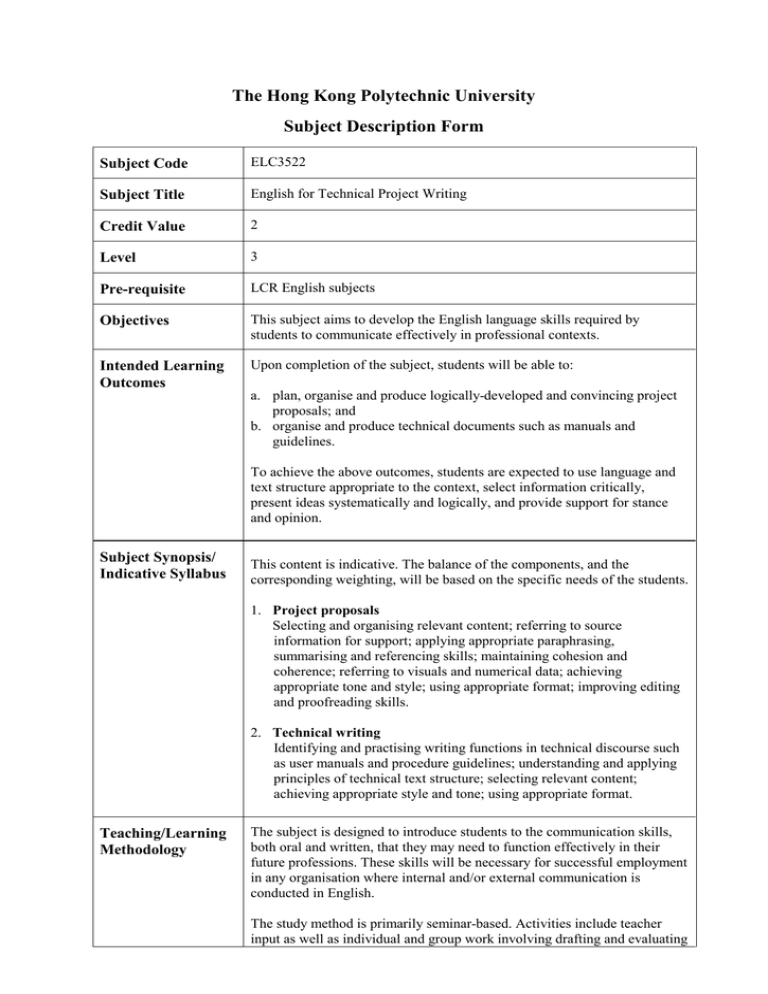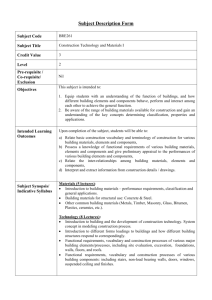
The Hong Kong Polytechnic University
Subject Description Form
Subject Code
ELC3522
Subject Title
English for Technical Project Writing
Credit Value
2
Level
3
Pre-requisite
LCR English subjects
Objectives
This subject aims to develop the English language skills required by
students to communicate effectively in professional contexts.
Intended Learning
Outcomes
Upon completion of the subject, students will be able to:
a. plan, organise and produce logically-developed and convincing project
proposals; and
b. organise and produce technical documents such as manuals and
guidelines.
To achieve the above outcomes, students are expected to use language and
text structure appropriate to the context, select information critically,
present ideas systematically and logically, and provide support for stance
and opinion.
Subject Synopsis/
Indicative Syllabus
This content is indicative. The balance of the components, and the
corresponding weighting, will be based on the specific needs of the students.
1. Project proposals
Selecting and organising relevant content; referring to source
information for support; applying appropriate paraphrasing,
summarising and referencing skills; maintaining cohesion and
coherence; referring to visuals and numerical data; achieving
appropriate tone and style; using appropriate format; improving editing
and proofreading skills.
2. Technical writing
Identifying and practising writing functions in technical discourse such
as user manuals and procedure guidelines; understanding and applying
principles of technical text structure; selecting relevant content;
achieving appropriate style and tone; using appropriate format.
Teaching/Learning
Methodology
The subject is designed to introduce students to the communication skills,
both oral and written, that they may need to function effectively in their
future professions. These skills will be necessary for successful employment
in any organisation where internal and/or external communication is
conducted in English.
The study method is primarily seminar-based. Activities include teacher
input as well as individual and group work involving drafting and evaluating
texts, mini-presentations and discussions. Students will be referred to
information on the Internet and the ELC’s Centre for Independent Language
Learning.
Learning materials developed by the English Language Centre are used
throughout this course. Additional reference materials will be recommended
as required.
Assessment Methods
in Alignment with
Intended Learning
Outcomes
Specific assessment
methods/tasks
%
weighting
Intended subject learning outcomes
to be assessed (Please tick as
appropriate)
a
1. Proposal
40%
2. Technical writing
60%
Total
b
100 %
Explanation of the appropriateness of the assessment methods in assessing
the intended learning outcomes:
Students’ oral and writing skills are evaluated through assessment tasks
related to the learning outcomes. Students are assessed on the accuracy and
the appropriacy of the language used in fulfilling the assessment tasks, as
well as the selection and organisation of ideas.
Student Study
Effort Required
Class contact:
Seminars
26 Hrs.
Other student study effort:
Classwork-related and project-related preparation
and self-access work
Total student study effort
Reading List and
References
52 Hrs.
78 Hrs.
Barker, T. T. (2005). Writing software documentation: A task-oriented
approach (2nd ed.). New York, NY: Longman.
Dawson, C. W. (2000). The essence of computing projects: A student’s
guide. New York, NY: Prentice Hall.
Johnson-Sheehan, R. (2008). Writing proposals (2nd ed.). New York, NY:
Pearson/Longman.
Houp, K. W., Pearsall, T. E., Tebeaux, E. & Dragga, S. (2006). Reporting
technical information (11th ed.). New York, NY: Oxford University
Press.
Northey, M. & Jewinski, J. (2007). Making sense: A student’s guide to
research and writing: engineering and the technical sciences (2nd
ed.). Don Mills, ON: Oxford University Press.
Reep, D. C. (2006). Technical writing: Principles, strategies and readings
(6th ed.). New York, NY: Pearson/Longman.


